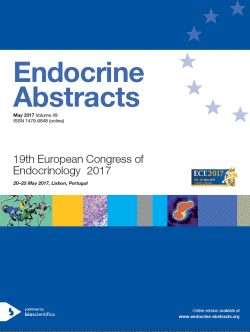Searchable abstracts of presentations at key conferences in endocrinology

19th European Congress of Endocrinology
Lisbon,
Portugal
20 May 2017 - 23 May 2017
20-23 May 2017, Lisbon, Portugal
Further information
Symposia
Moving away from old-fashioned steroidogenesis: what are the clinical implications?
ea0049s30.1 | Moving away from old-fashioned steroidogenesis: what are the clinical implications? | ECE2017
Clinical relevance of alternative synthesis of androgens
Recent years have seen many exciting developments in the field of steroidogenesis. These include improved diagnostics through mass spectrometry, novel clinical relevance attributed to steroids previously deemed irrelevant and successful implementation of new anti-cancer treatments. Prostate cancer is a prime example of the latter with the recent confirmation that castration-resistant disease is still androgen-dependent and susceptible to hormonal manipulation with next generat...
ea0049s30.2 | Moving away from old-fashioned steroidogenesis: what are the clinical implications? | ECE2017
Clinical relevance of steroid precursors in adrenocortical tumors
Adrenal incidentalomas represent an increasingly common diagnostic problem facing clinical Endocrinologists. Swift and accurate differentiation of benign from malignant disease is essential, but the diagnostic performance of current imaging modalities is sub-optimal and often leads to ill-advised management decisions. Urinary steroid profiling by modern mass spectrometry-based techniques can provide a comprehensive profile of steroidogenesis, quantifying both precursor molecul...
ea0049s30.3 | Moving away from old-fashioned steroidogenesis: what are the clinical implications? | ECE2017
Glucocorticoid production in primary aldosteronism – from mechanisms to clinical implications
Adrenal aldosterone excess is the most common cause of secondary hypertension and is associated with increased cardiovascular morbidity and mortality. However, adverse metabolic risk in primary aldosteronism extends beyond hypertension, with increased rates of insulin resistance, type 2 diabetes, and osteoporosis, which cannot be easily explained by aldosterone excess but would rather be associated with oversecretion of glucocorticoids. Over the last years, exome sequencing ha...



